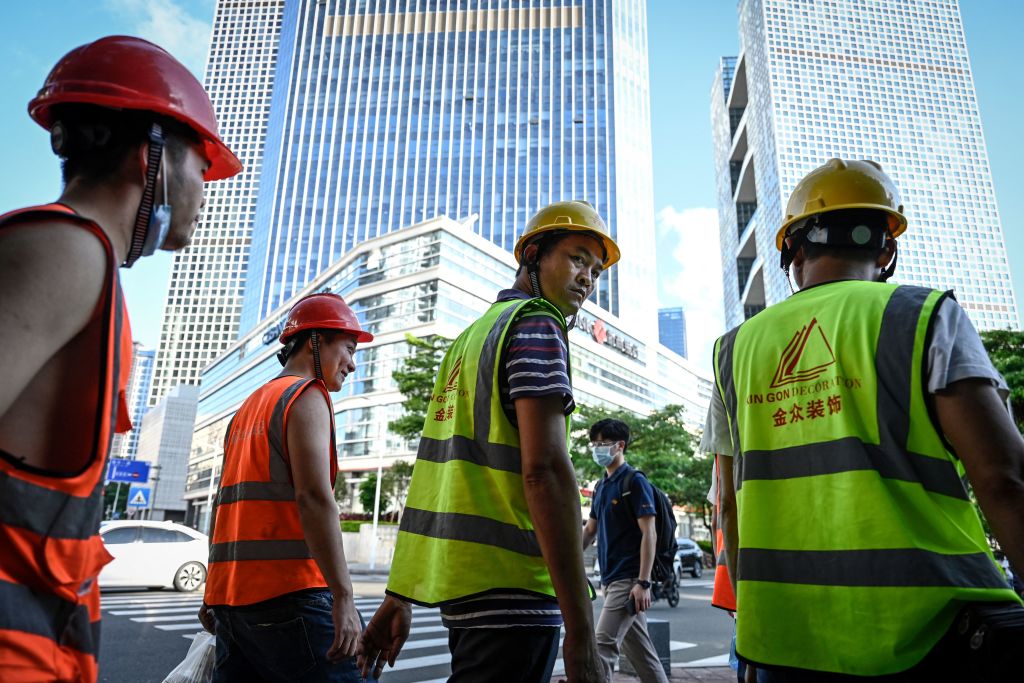
The Chinese government seems to have fallen back in love with economic growth. As the chaotic exit from its zero-Covid-19 policy has unfolded—leading to tens of thousands of deaths (at least)—the country’s leaders have been eager to profess their undying devotion to robust economic recovery. But lip service alone will get China nowhere.
Last month’s central economic work conference—the annual meeting where the top leadership of the Chinese Communist Party sets the economic-policy agenda for the next year—established growth as the government’s top economic priority in 2023. In the weeks that followed, the public was treated to a spectacle not seen in years, as provincial governors fell over themselves to echo the CCP’s commitment to growth and reassure jittery private investors and entrepreneurs.
The political motivation for this shift is obvious: the CCP hopes to restore public support, after popular frustration with draconian zero-Covid restrictions gave way to dissatisfaction with the botched exit from the policy. But it will mean little unless the government translates its pro-growth rhetoric into action.
To some extent, it already has. From easing borrowing restrictions on ‘high-quality’ property developers to supporting demand for housing, measures aimed at breathing new life into the beleaguered real-estate sector are high on the government’s agenda.
But such efforts are far from sufficient. As important as the property sector is to China’s GDP, a (moderate) real-estate rebound alone cannot drive a comprehensive economic recovery, let alone a return to rapid growth. Likewise, the government’s other short-term stimulus measures—such as monetary and fiscal expansion, including infrastructure investment—will likely provide only a temporary boost.
Zero-Covid restrictions left deep scars on China’s economy. Before the pandemic, the country boasted 44 million micro and small enterprises, which accounted for about 98% of all registered businesses and some 80% of jobs outside the state sector. More than 90 million individuals were self-employed.
But zero-Covid changed all that. Because lockdowns were not accompanied by direct financial assistance for micro and small firms, many were driven out of business, placing a serious drag on growth.
Geopolitical pressures—not least the tech war with the United States—are compounding the impediments to Chinese growth. America is more committed than ever to restricting China’s access to semiconductors and is applying diplomatic pressure on the Netherlands to block the Dutch company ASML from selling a wider range of its chip-production machines to China. The possibility of new American sanctions on China cannot be ruled out, especially now that Republicans control the US House of Representatives.
Meanwhile, China’s implicit support for Russia’s war against Ukraine has soured its relations with its second-largest trading partner, the European Union. Some in Europe are now following the US example and calling for an economic ‘decoupling’. Already, many European companies are seeking to diversify their manufacturing supply chains—including by sourcing alternative inputs and shifting some production—in order to reduce their reliance on China.
As long as geopolitical tensions persist, the business climate will remain uncertain, discouraging investment and reducing manufacturing employment as foreign companies exit the market. Finding ways to improve relations with the West is thus a prerequisite for economic recovery.
To be sure, the Sino-American relationship is probably beyond repair at this point. Nonetheless, China could improve the diplomatic atmosphere by limiting its support for Russian President Vladimir Putin, as well as its sabre-rattling vis-à-vis Taiwan, thereby assuaging investors’ fears of a Chinese invasion or naval blockade of the island.
At the same time, China must launch a credible reform program. Under President Xi Jinping’s leadership, China’s government has embraced orthodox communist ideology and sought to increase the party’s dominance over society and the economy. This approach—exemplified by tighter social control, the establishment of CCP cells in private firms and provocations against China’s most important trading partners—has severely damaged business confidence.
If the CCP is serious about growth, it must recommit to former leader Deng Xiaoping’s most important political reforms, such as meritocracy, mandatory retirement and term limits. Increasing the legal system’s independence is particularly urgent, in order to reassure private entrepreneurs that their personal safety and property will be protected.
In terms of economic policy, China must privatise inefficient state-owned enterprises and create a more business-friendly regulatory environment. Measures aimed at supporting small businesses are also essential to a lasting economic recovery.
Despite all the talk about growth, China’s government has not unveiled any such plans. And nothing in official government rhetoric indicates that a fundamental change of direction—like Deng’s decisive break with Maoist ‘class struggle’ in 1979—is being considered. So, don’t believe the hype: China’s economy may be sputtering for a while yet.

